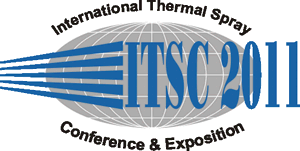
|
2882 |
|
Wednesday, September 28, 2011, Saal B2.1 9:50 AM Cold Spraying 3 |
|
Impact conditions for cold spraying of hard metallic glasses |
|
Alexander List* / Helmut Schmidt University of the Federal Armed Forces, Germany Frank Gärtner / Helmut Schmidt University, University of the Federal Armed Forces Hamburg, Germany Thomas Klassen/ Helmut Schmidt University, University of the Federal Armed Forces Hamburg, Germany |
|
Due to the lower process gas temperature in cold spraying as compared to thermal spray techniques it is possible to retain metastable phases of the feedstock material, as for example amorphous structures in the sprayed coatings. As well known, metallic glasses are brittle at ambient temperatures. Thus, cold spray parameters must be tuned for conditions that allow softening of the spray material for successful coating formation. Bulk metallic glasses that reach requested conditions are mainly based on early transition metals and / or contain rare earth elements. Classical glass forming alloys are based on metal-metalloid systems, containing about 20 at. % of C, B or P. They have some advantages with respect to higher hardness, less costly feedstock powder and minimum reactivity with the environment. Thus the present study focuses on a FeCoCrMoBC metallic glass as example. Necessary impact conditions were investigated to meet the window of deposition in cold spraying. According to calculations and cold spray results, neither the glass transition temperature Tg nor the melting temperature Tm can describe critical conditions for bonding. For calculations of the critical velocity of metallic glasses a so called softening temperature between the glass temperature and the melting temperature had to be defined. Based on a precise prediction of critical conditions for coating formation, and based on a systematic variation of spray parameters and substrate material, the most influential factors on increased deposition efficiency and minimum coating porosity could be derived. The results demonstrate that metallic glass coatings with very high hardness can be produced by cold spraying. |